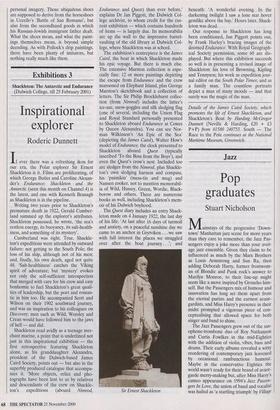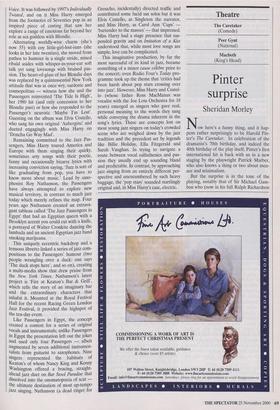Jazz
Pop graduates
Stuart Nicholson
Mainstays of the progressive 'Down- town' Manhattan jazz scene for more years than they care to remember, the Jazz Pas- sengers enjoy a joke more than your aver- age jazz ensemble. Given they claim to be influenced as much by the Marx Brothers as Louis Armstrong and Sun Ra, then adding Deborah Harry, former frontwom- an of Blondie and Punk rock's answer to Marilyn Monroe, to their line-up might seem like a move inspired by Grouch() him- self. But the Passengers mix of humour and innovation has long set them apart from the eternal purists and the earnest avant- gardists, and Miss Harry's presence in their midst prompted a vigorous piece of con- ceptualising that allowed space for both singer and band to shine.
The Jazz Passengers grew out of the sax- ophone-trombone duo of Roy Nathanson and Curtis Fowlkes in the mid-Eighties with the addition of violin, vibes, bass and drums. Their early albums revealed a witty reordering of contemporary jazz leavened by occasional rambunctious humour. Maybe in the conservative Eighties the world wasn't ready for their brand of avant- garde merry-making but, after Miss Harry's cameo appearance on 1994's Jazz Passen- gers In Love, the union of band and vocalist was hailed as 'a startling triumph' by Village Voice. It was followed by 1997's Individually Twisted, and on it Miss Harry emerged from the footnotes of Seventies pop in an inspired piece of casting that saw her explore a range of emotions far beyond her role as sex goddess with Blondie.
Alternating worldly-wise charm (she's now 55) with coy little-girl-lost-isms (she looks in her late twenties), she moved from pathos to humour in a single stride, mixed ribald asides with whisper-in-your-ear soft talk yet sang lovesongs with bruised pas- sion. The heart-of-glass of her Blondie days was replaced by a quintessential New York attitude that was at once wry, sardonic and cosmopolitan — witness how she and the Passengers reinvented 'The Tide Is High', her 1980 hit (and only concession to her Blondie past) or how she responded to the Passenger's neurotic 'Maybe I'm Lost'. Guesting on the album was Elvis Costello, who sang his own original 'Aubergine' and dueted engagingly with Miss Harry on `Doncha Go Way Mad'.
Remaining committed to the Jazz Pas- sengers, Miss Harry toured America and Europe with them singing their quirky, sometimes arty songs with their poetic, funny and occasionally bizarre lyrics with increasing conviction saying, 'Jazz is sort of like graduating from pop, you have to know more about music.' Lead by saxo- phonist Roy Nathanson, the Passengers have always attempted to explore new musical territory, in contrast to much jazz today which merely refines the map. Four years ago Nathanson created an extrava- gant tableau called 'The Jazz Passengers in Egypt' that had an Egyptian queen with a Brooklyn accent you could cut with a knife, a portrayal of Walter Cronkite dancing the lambada and an ancient Egyptian jazz band smoking marijuana.
This uniquely eccentric backdrop and a tenuous libretto linked a series of jazz com- positions to the Passengers' humour (two people wrangling over a duck: one says `The duck stops here', and so on), creating a multi-media show that drew praise from the New York Times. Nathanson's latest project is 'Fire at Keaton's Bar & Grill', which tells the story of an imaginary bar and the extraordinary characters that inhabit it. Mounted at the Royal Festival Hall for the recent Racing Green London Jazz Festival, it provided the highspot of the ten-day event.
Like Passengers in Egypt, the concept created a context for a series of original vocals and instrumentals; unlike Passengers in Egypt the presentation left out the jokes and used only four Passengers — albeit augmented by seven additional instrumen- talists from guitarist to saxophones. Nine singers represented the habitués of Keaton's of whom Nancy King and Kenny Washington offered a bracing, straight- ahead jazz duet on Bar Stool Paradise that dissolved into the onomatopoeia of scat the ultimate destination of most up-tempo Jazz singing. Nathanson (a dead ringer for Groucho, incidentally) directed traffic and contributed some lucid sax solos but it was Elvis Costello, as Singleton the narrator, and Miss Harry, as Carol Ann 'Cups' 'bartender to the masses' — that impressed. Miss Harry had a stage presence that sus- pended gravity and on Imitation of a Kiss understood that, while most love songs are simple, love can be complicated.
This imaginative production, by far the most successful of its kind in jazz, became something of a minor cause célèbre prior to the concert; even Radio Four's Today pro- gramme took up the theme that 'critics had been harsh about pop stars crossing over into jazz'. However, Miss Harry and Costel- lo (whose father Ross MacManus was vocalist with the Joe Loss Orchestra for 18 years) emerged as singers who gave real, personal meaning to the words they sang while conveying the drama inherent in the song's lyrics. These are concepts lost on most young jazz singers on today's crowded scene who are weighed down by the jazz tradition and the precedent set by legends like Billie Holiday, Ella Fitzgerald and Sarah Vaughan. In trying to navigate a route between vocal callisthenics and pas- sion they usually end up sounding bland and predictable. In contrast, by approaching ja77 singing from an entirely different per- spective and unencumbered by such heavy baggage, the 'pop stars' sounded startlingly original and, in Miss Harry's case, electric.






























































































 Previous page
Previous page